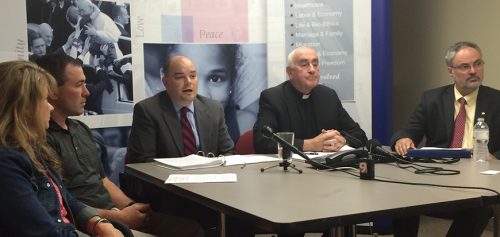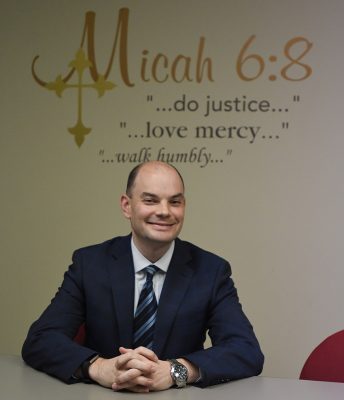This year marks Jason Adkins’ 10th anniversary as executive director of the Minnesota Catholic Conference, the official public policy voice of the Catholic Church in Minnesota. In this capacity, he works with the state’s bishops to shape public policy that protects human dignity and promotes the common good. This ministry involves education and advocacy, and it has been marked by a variety of successes and challenges over the last decade.
Adkins was hired for the leadership post in March 2011. He was born in Detroit, but grew up in Minnesota, graduating from Apple Valley High School in 1996. He has a brother and sister who are teachers. His mother was a homemaker (she passed away in 2003). His father, Gary, is a numismatist (rare coin expert) who serves as past president of the American Numismatic Association.

Adkins has a bachelor’s degree in economics and theology from the University of St. Thomas in St. Paul, where he also earned a master’s degree in Catholic studies. He has a law degree from the University of Minnesota. He spent time in Rome as a journalist for the Zenit news agency and later worked as a teacher and law clerk to state and federal appellate judges.
The Central Minnesota Catholic recently interviewed Adkins about what motivates him, how his work impacts his faith, and what gives him hope for the future. It has been edited for length and clarity.
Q. What was your faith life like as a young person?
A. My parents did a fantastic job of nurturing us in the virtues. I learned a lot from my father about how to deal with people fairly. We attended Mass every week. My parents placed a strong emphasis on what it meant to lead a Christian moral life and really prepared the seeds and tilled the soil for them. When I was mature enough to take my faith seriously, that seed fell on more fertile ground. When I came to the University of St. Thomas and was blessed to connect with the right people, those seeds of faith grew.
I wasn’t well-formed at my parish; it was a time when catechesis was not substantive. I resolved to do something about that. Some friends of mine and my now-wife started something called the Corpus Christi Catechism Fund. I never knew there was a catechism until I got to college, and I didn’t want other people to go through that. We raised money and distributed over 80,000 catechisms in the Archdiocese of St. Paul and Minneapolis when people were confirmed. It was over a 10- or 11-year period. Just knowing that even if people didn’t crack open the book, they knew there was a place that had answers to some of life’s deepest questions. That’s something that I believe we need to let people know — that faith has an objective content. The doctrines aren’t just rules or impositions that create barriers to an authentic faith experience; rather, they’re life-giving truths that guide it.
Q. How did you end up as executive director of MCC?

A. I was a young public interest litigator at the time and building the foundations for a successful legal practice. I wasn’t looking for a new job. I loved my job at the Institute for Justice working on some cutting-edge cases. But I was asked to apply, and I made a commitment early on when I went to law school that my profession and my practice were going to be about service. I put that in the hands of the Lord to let him do with it what he chose. So, I had a commitment to being open to whatever was put in front of me. I think what distinguished me from some of the other candidates is that I presented a plan: education, communication and lay mobilization. The bishops seemed to coalesce around that vision.
Q. What are you most proud of during these last 10 years?
A. I hope we’ve created opportunities for Catholics to think about politics as a mode of discipleship. As Pope Francis says, it’s one of the highest forms of charity because it serves the common good. It’s not a hobby that we can delegate to the people who are interested in it, but it’s a way in which we evangelize, in which we work for human dignity. It’s a way in which we live discipleship. Pope Francis talks about this in both “Fratelli Tutti,” his new encyclical, and his World Peace Day message in 2019: “Good Politics is at the Service of Peace.”
Q. What has been the biggest challenge in these 10 years?
A. I think overcoming the polarization and people being overly results-oriented. People want to see legislative victories on big questions that have significant moral import — whether it’s immigration, the environment or abortion. As a result of that desire for particular legislative outcomes, they’ve aligned themselves with “team red” or “team blue.” So, our work and the work of the Church is viewed as whether or not, at any given moment, it’s supporting the Republicans or Democrats when, in fact, the Church desires to be principled and not partisan and to do so in a way that supports human dignity and the common good.
The main thing that we have to remember is that, ultimately, the victory has been won. It’s our job to simply do the right thing consistent with our principles. The job of the Church is not to end abortion. It’s not to bring about comprehensive immigration reform or fight climate change. It’s to make Jesus Christ known and loved. Our political work is a way in which we do that. But, ultimately, it’s not the end goal because we know that that final victory for justice has already been won. Our Lord will come again in glory to judge the living and the dead and his kingdom will have no end. But it’s our responsibility to do the best we can as disciples, to love our neighbor, to promote a society of human dignity and the common good — but in a principled way that ultimately does honor to our Lord and works to make him known and loved first, and not to make that secondary to political and electoral outcomes.
Q. Has your job has impacted your faith?
A. Undoubtedly. We are all on the journey. When you work in ministry and when you understand your work in a missionary and evangelical framework, as Pope Francis calls us to, it’s going to challenge you on a regular basis to do things rightly — to say that it’s not about me, or it’s not about the cause, or it’s not about the goal. It’s about the Lord. What does that look like in any given context? It requires you to continue to pray and think about each particular issue, each particular advocacy initiative or goal, and how we interact with others. What should political engagement look like? What are the things you can do? What are the things you cannot do? Am I (we) being/bringing Christ to others in this work?
To use an analogy, there are many “Sauls” out there who want to give us their worldly armor for the fight. But we must be like David, content to fight the Goliaths of our day with the armor of God and what little we are given. Trusting in those, we can fight not primarily to win, but to do his will in all things and let his providence take care of the rest.
Q. You’re an oblate of the Valley of Our Lady Cistercian Monastery in Wisconsin. How did this come about, and what impact has it had on your life and work?
A. One of the women who played violin at my wedding became one of the sisters there, so I connected with them around 12 years ago when they were thinking about putting together a plan to build a new monastery (build.valleyofourlady.org). Off and on, through the years, I stayed connected.
I never thought of myself as a joiner. I thought I could sort of take a little bit from all the charisms of the various communities and use those — whether it’s the Catholic Worker Movement or Opus Dei, from which I’ve really benefited. But the need for more intentionality in my spiritual life really provoked me.
It was a book titled “The Soul of the Apostolate,” in which Dom Chautard, a French Trappist abbot, wrote about how the life of the apostolate is nurtured in the life of prayer. So, for me to be effective in this job, I needed to be more intentional about nurturing the life of prayer and, in particular, carving out what the Cistercians or monastics call the hermitage of the soul. The Cistercian life and oblation bring a certain intentionality and structure around the prayer life to create that space of silence where you can hear that still, small voice and block out all the distractions. The witness of those lovely sisters has really been a blessing to me.
Q. What are some of your hobbies outside of work?
A. I’m a member of the Minneapolis Rowing Club. I rowed in college and was excited after a long time away from the sport to get back into rowing. I love being out on the Mississippi — whether it’s with the crew or in a single shell — just rowing and seeing the beautiful river valley, watching eagles swoop down right in front of me and snatch fish out of the water. It’s a time of relaxation. It’s good physical exertion. We have to keep our bodies in shape as well as our minds and our souls. And so that’s been a real gift over the last couple of years, along with learning to downhill ski. And, of course, reading. I do copious amounts of reading and really enjoy that.
JASON ADKINS — AT A GLANCE
FAMILY: wife Annamarie, four children
PARISH: St. Agnes, St. Paul
BIRTHPLACE: Detroit, Michigan
EDUCATION: Apple Valley High School, Apple Valley, Minnesota
B.A., economics and theology, University of St. Thomas, St. Paul
M.A., Catholic Studies, University of St. Thomas
Juris Doctor, University of Minnesota Law School, Minneapolis
HOBBIES: rowing, reading
CURRENT BOOK HE’S READING: “Thunder at Twilight” by Frederic Morton, which chronicles the political and intellectual milieu of Vienna on the eve of the First World War
FAVORITE MOVIES: “Jesus of Nazareth” directed by Franco Zeffirelli; the “Godfather” trilogy
FAVORITE SAINTS: St. Therese of Lisieux, St. Thomas More, St. Aelred of Rievaulx
FAVORITE SCRIPTURE PASSAGE: Jeremiah 29






















